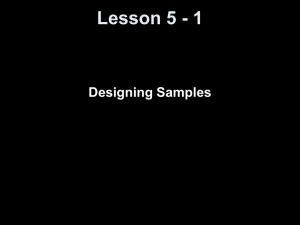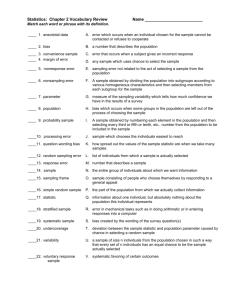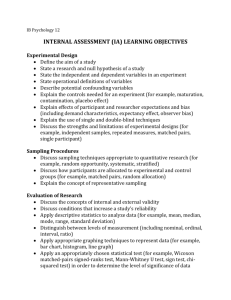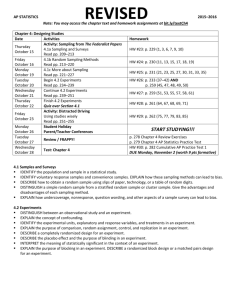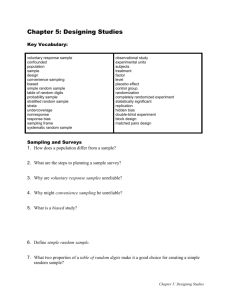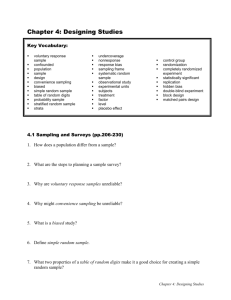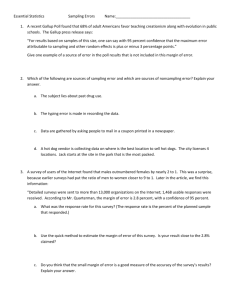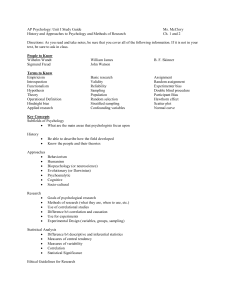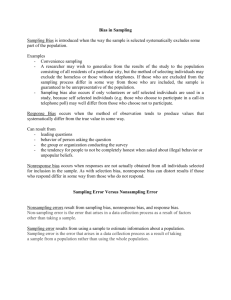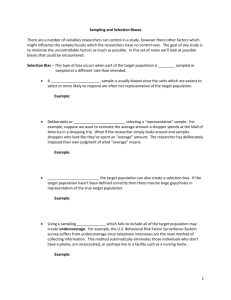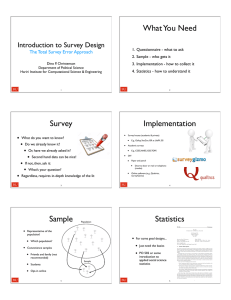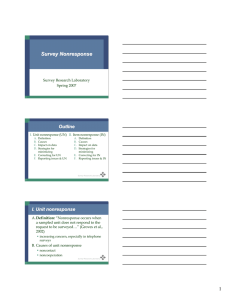Day Two
advertisement
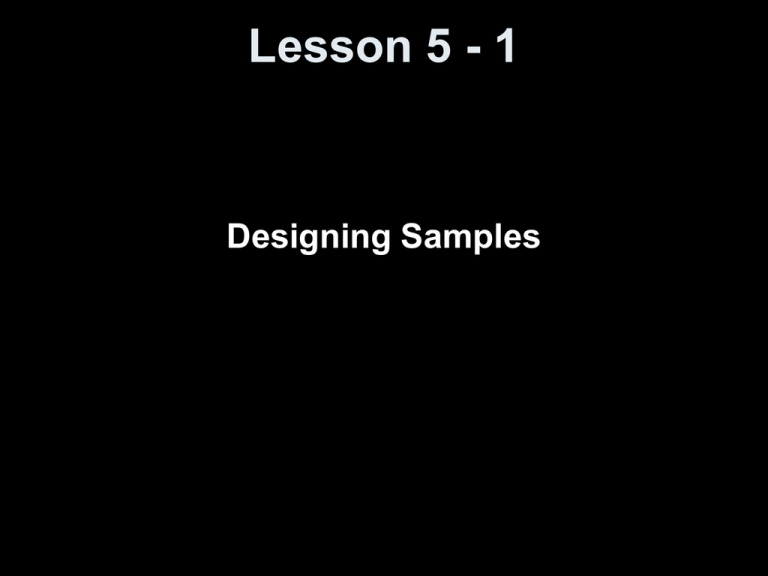
Lesson 5 - 1 Designing Samples Knowledge Objectives • • • • • • • • • • Define population and sample. Explain how sampling differs from a census. Explain what is meant by a voluntary response sample. Give an example of a voluntary response sample. Define, carefully, a simple random sample (SRS). List the four steps involved in choosing an SRS. Explain what is meant by systematic random sampling. Define a probability sample. Define a cluster sample. Define undercoverage and nonresponse as sources of bias in sample surveys. • Give an example of response bias in a survey question. Construction Objectives • Explain what is meant by convenience sampling. • Define what it means for a sampling method to be biased. • Use a table of random digits to select a simple random sample. • Given a population, determine the strata of interest, and select a stratified random sample. • Write a survey question in which the wording of the question is likely to influence the response. • Identify the major advantage of large random samples. Vocabulary • Statistics – science of collecting, organizing, summarizing and analyzing information to draw conclusions or answer questions • Information – data • Data – fact or propositions used to draw a conclusion or make a decision • Anecdotal – data based on casual observation, not scientific research • Descriptive statistics – organizing and summarizing the information collected • Inferential statistics – methods that take results obtained from a sample, extends them to the population, and measures the reliability of the results • Population – the entire collection of individuals • Sample – subset of population (used in the study) Bias From Sullivan: • Bias – nonsampling error introduced by giving preference to selecting some individuals over others, by giving preference to some answers by wording the questions a particular way, etc • Key is systematically favoring something (not being a random selection) Sources of Bias • Undercoverage results from an incomplete frame on the surveyor’s part • Nonresponse can be from either the surveyor (can’t find the person) or the person’s unwillingness to answer • Response bias (lies) can result from either the respondent or the influence of the interviewer Errors in Sampling Sampling Error Non sampling Error Designer sample gives incomplete information about the population Subject Nonresponse Misrepresented answers Incomplete Frame Questionnaire Design Poorly worded questions Inflammatory words Question order Response order Sampling Process Iceberg Interviewer errors Collection Execution Data-entry (input) errors Analysis Process Sources of Nonsampling Error • Incomplete Frame (not all of population) • Nonresponse (not getting information) • Data Collection errors – Interviewer error – Misrepresented answers – Data-entry (input) errors • Questionnaire Design – – – – Poorly worded questions Inflammatory words Question order Response order Example Problems a) Determine is the survey design is flawed b) If flawed, is it due to the sampling method of the survey itself c) For flawed surveys, identify the cause of the error d) Suggest a remedy to the problem Example 1 MSHS wants to conduct a study regarding the achievement of its students. The principal selects the first 50 students who enter the building on a given day and administers the survey. Flawed sampling method Example 2 The Marion town council wishes to conduct a study regarding the income level of households in Marion. The town manager selects 10 homes in one neighborhood and sends an interviewer to the homes to determine household incomes. Flawed sampling method Example 3 An anti-gun advocacy group wants to estimate the percentage of people who favor stricter gun laws. They conduct a nation-wide survey of 1,203 randomly selected adults 18 years old and older. The interviewer asks the respondents, “Do you favor harsher penalties for individuals who sell guns illegally?” Poorly worded question Example 4 Cold Stone Creamery is considering opening a new store in Marion. Before opening the store, the company would like to know the percentage of households in Marion that regularly visit an ice cream shop. The market researcher obtains a list of households in Marion and randomly selects 150 of them. He mails a questionnaire to the households that asks about their ice cream eating habits and favor preferences. Of the 150 questionnaires mailed, 14 are returned. Nonresponse Example 5 The owner of shopping mail wishes to expand the number of shops available in the food court. She have a market researcher survey mall customers during weekday mornings to determine what types of food the shoppers would like to see added to the food court. Flawed sample method Example 6 The owner of radio station wants to know what their listeners think of the new format. He has the announcers invite the listeners to call in and voice their opinion. Flawed sample method Summary and Homework • Summary – Sources of Bias • Voluntary and convenience samples • Undercoverage, Nonresponse, response bias and poorly worded questions • Homework – Day 2: pg 347-51 problems 5.15-17, 5.20, 5.22, 5.24, 5.28-30
